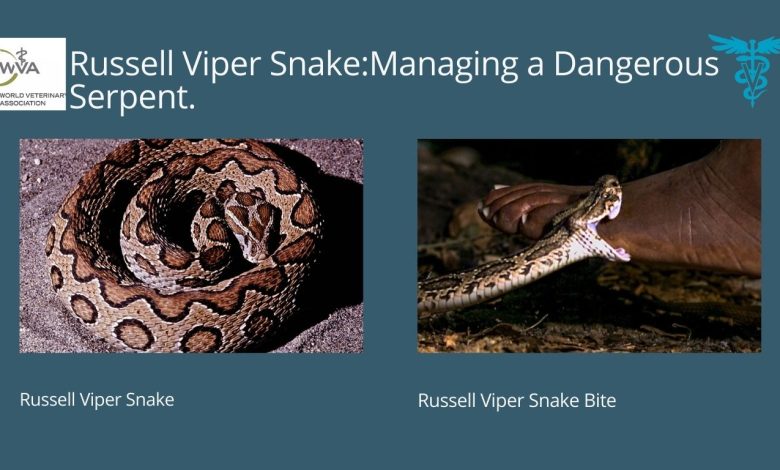Russell Viper Snake:Managing a Dangerous Serpent

Russell Viper Snake (Daboia russelii) ,original name Russell’s Viper is one of the most dangerous snakes in Asia, including Bangladesh. Known for its potent venom, this snake poses a significant threat to humans, particularly in rural areas where it is commonly found. This article delves into the history, genetic type, spread, and impact of Russell’s Viper bites on humans, providing essential information on diagnosis, preventive measures, treatment options, and advice for Bangladeshi farmers.
Table of Contents
History of Russell Viper Snake
Russell Viper is named after Patrick Russell, a Scottish herpetologist who first described the species in the late 18th century. This snake is prevalent across the Indian subcontinent, Southeast Asia, and parts of China. Known for its distinctive chain-like pattern and aggressive nature, Russell’s Viper has been a subject of extensive research due to its medical significance.
Genetic Type
Russell Viper belongs to the family Viperidae and the genus Daboia. Its genetic makeup is characterized by a highly potent hemotoxin, which affects blood coagulation and can cause severe internal bleeding, kidney failure, and other systemic complications. The snake’s venom is complex, containing enzymes that disrupt cellular functions and damage tissues.
Spread and Habitat
Russell Viper Snake is widespread in various habitats, including grasslands, farmlands, and forested areas. It is particularly common in agricultural regions where it preys on rodents, thus bringing it into frequent contact with humans. In Bangladesh, this snake is often found in rural areas, increasing the risk of snakebites among farmers and villagers.
Read More: Visit Now
Bite Impact on Humans
The bite of a Russell Viper is extremely dangerous and can be fatal if not treated promptly. Symptoms typically appear within minutes to hours after the bite and include:
- Severe pain and swelling at the bite site
- Blistering and necrosis
- Blood from mouth, noses, and other openings
- Vomiting and abdominal pain
- Dizziness and confusion
- Kidney failure and shock in severe cases
The mortality rate for untreated bites can be as high as 20%, making immediate medical intervention crucial.
Learn About Vaccination of Rabies: Click Now
Diagnosis
Diagnosing a Russell’s Viper bite involves clinical evaluation and laboratory tests. Key diagnostic steps include:
Free LSD Disease Treatment: Visit Now
- Clinical Symptoms: Observing the characteristic symptoms such as swelling, pain, and bleeding.
- Blood Tests: Checking for coagulopathy, kidney function, and other systemic effects.
- Bite History: Confirming the snake species through patient history and, if possible, identifying the snake. Preventive Methods
Preventing Russell Viper Snake bites involves several strategies:
- Avoid High-Risk Areas: Avoid walking in tall grass, agricultural fields, and forested areas without protective footwear.
- Use Protective Gear: Wear boots and gloves when working in snake-prone areas.
- Clear Vegetation: Keep living and working areas clear of tall grass and bushes where snakes may hide.
- Snake Awareness: Educate communities about snake habitats and behaviors to reduce accidental encounters.
- Lighting: Use flashlights or lanterns when walking outdoors at night to spot snakes. Treatment and Medicine Group Names
Treating a Russell’s Viper bite requires prompt and effective medical intervention:
- First Aid:
- Keep the patient calm and do not mobilize the affected limb.
- Avoid applying ice, tourniquets, or cutting the wound.
- Hospital Treatment:
- Antivenom: Administering polyvalent antivenom is the primary treatment. The cost can vary, but it typically ranges from BDT 1,500 to BDT 3,000 per vial, with several vials often needed.
- Supportive Care: Providing fluids, pain management, and treating complications such as coagulopathy and renal failure.
- Monitoring: Continuous monitoring of vital signs and laboratory parameters. Medicine Group Names for Different Ages
- Children: Antivenom dosage is generally the same as for adults, adjusted for body weight.
- Adults: Polyvalent antivenom, supportive medications like analgesics, and anticoagulants if necessary.
- Elderly: Special care to manage underlying health conditions and potential complications. Cost for Complete Recovery
The total cost for recovery from a Russell’s Viper bite can be significant, including the cost of antivenom, hospitalization, supportive care, and follow-up treatments. On average, complete recovery might cost between BDT 50,000 to BDT 100,000, depending on the severity of the bite and the duration of hospitalization.
Advice for Bangladeshi Farmers
- Stay Vigilant: Always be aware of your surroundings, especially when working in fields or near water sources.
- Use Protective Gear: Wear boots and gloves to minimize the risk of bites.
- Clear Areas: Keep agricultural and residential areas free of tall grass and debris where snakes can hide.
- Educate Community: Conduct awareness programs on snakebite prevention and first aid.
- Have Emergency Plans: Ensure quick access to medical facilities equipped to handle snakebite emergencies.
For more information on snakebite management and treatment options, visit the World Health Organization , Bangladesh Snakebite Project as well asUnderstanding Snake Venom
Russell’s Viper remains a significant threat in Bangladesh, especially for those living in rural areas. Understanding its biology, the impact of its bite, and the necessary preventive and treatment measures can save lives. By staying informed and prepared, farmers and other at-risk individuals can reduce the incidence and severity of snakebites, ensuring better outcomes and safer communities.


